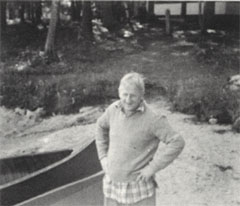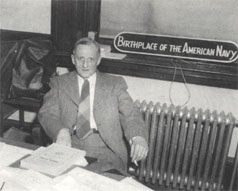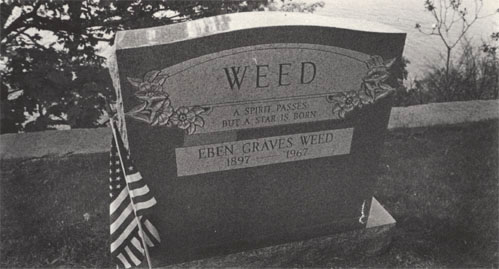|
I think a sword was sheathed the other day.
I'll miss the flash and fire I've known so long.
An honored blade that proud men lay away
While it's still shining bright and straight and strong.
The sword was that of Eben Graves Weed and the poem in tribute to the
fiery, long-time editor of The Marblehead Messenger was penned by his
brother, Dan Weed. It appeared on the paper's front page three days
after Eben died on January 23, 1967.
 Eben
Weed: the mischievous Marblehead farm boy who went on to famed Phillips
Andover Academy, to Yale and Harvard, served courageously overseas in
both World War I and II, and in Marblehead pursued a forty-year career
as editor and eighteen years as an official of the town he loved and
fought for so much. Eben
Weed: the mischievous Marblehead farm boy who went on to famed Phillips
Andover Academy, to Yale and Harvard, served courageously overseas in
both World War I and II, and in Marblehead pursued a forty-year career
as editor and eighteen years as an official of the town he loved and
fought for so much.
He made newspaper
publishing respectable in Marblehead.
In those years, Marblehead had no more eloquent nor fearless
spokesman than Eben Weed. He was a zealot in defending the traditons
of the 300-year
old town, yet he was visioinary enough to recognize and accept the changes
that must come with time. During his four decades of editorship, he saw
the community that once had been a fishing village and then busy center
of shoe manufacturing being transformed partially to a summer resort
and
yachting base, and then to its present status as a growing "bedroom" community.
Almost appropriately, to be witness and recorder of much of this change,
Eben was born just before the turn of the century. On February 24, 1897,
he was born on the old Harris Farm, off Village Street, to the town's
favorite postman and poet, Wallace Dana Weed and Elizabeth Graves Weed.
One of this beloved couple's five boys and two girls, Eben's local ancestry
went back to farmer Daniel Weed who settled in the town in 1750. He was,
then, should anyone challenge it, "a true Marbleheader."
Farmboy? Yes. At the Harris Farm and the Childs' Farm close by the present
General Glover Inn where Wallace Weed soon moved his family, the farming
was done by Eben Graves, the maternal uncle after whom Eben was named,
and all the boys helped. On the farm his mother became an experienced
gardener, buying seeds from as far away as England and France. Here the
boys helped again by peddling her bouquets of flowers around town.
When it came to high school, Eben went to Marblehead High while his brother,
Allan, went to Salem High. As both were skilled first-basemen and both
made their school baseball teams, it happened that more than once they
played against each other in school league games. (This sibling rivalry
carried on in later years when Eben and Allan played on opposing teams
in the North Shore Twilight League).
For reasons unrecorded, Eben's stay at Marblehead Academy on Pleasant
Street, now occupied by the American Legion, was cut short, and Father
Wallace had him transerred to Phillips Andover Academy, from which he
himself had been graduated. At Andover, Eben continued to distinguish
himself as a baseball and football player but again ran afoul of academic
authority and, for the seemingly trivial offense of sneaking out after
hours to by a sandwich, was dismissed from school.
It hardly mattered, for he had already decided to enlist in the Army and,
if possible, to do battle overseas. This he did. He signed up with the
U.S. Army Fifth Division's 20th Field Artillery and at 19 went over to
France to serve the final two years of the war against the Kaiser. The
war over, he stayed abroad and took pre-university studies in England.
Thus equiped, Eben returned to the U.S., studied another year at Milford
Academy in Connecticut and in 1921 finally arrivd in New Haven for four
undergraduate years at Yale. He worked his way through the university
as a waiter and busboy. His scholastic record at Yale was adequate enough
for him to win his degree in 1925, but again his athletic record was only
a little shor of being phenomenal. Although weighing only 148 pounds at
Yale, by 1925 he had earned 17 varsity letters in high school and college
football and baseball.
After Yale, he followed the usual graduate route to New York City and
found work in the advertising field. Two years of making the rounds of
Manhattan offices, however, made him long for the sounds and smells and
friendly people of his native town. He returned to Marblehead.
His experience in advertising had instilled in him the ambitioin to
get into printing and publishing. Upon arriving back in Marblehead
in
1927 he viewed with a calculating eye the operatioins of N.A. Linday & Co.,
job printers and publishers of The Marblehead Messenger.

The Messenger had been founded by N.A. Lindsay more than a half-centry
earlier, in 1872, but was now owned and edited by Frank L. Armstrong.
A thriving weekly, it had a circulation of 1,500 in a population of
6,785, which meant that nearly every family was a
Eben at his "retreat" in
Maine, late in his career.
subscriber. Eben could not be blamed
for hustling around among his family friends, bankers, and businessmen
to borrow enough
money to buy the company. On June 1, 1927, the name "Weed Publishing
Co."replaced the old Lindsay title on the paper's masthead, and
Eben became editor and publisher. That same masthead (the boxed space
on the editorial page) had alsways included the paper's price: "Subscription
$2.00 a year; invariably" to stand until years later when he
increased the subscription rate to $2.50.
The young editor announced on the front page what The Messenger henceforth
would indubitably stand for. He printed in large type: "We lean
to three isms and three only: We are for God, for Country and for
Marblehead". For the same front page, his brother Dan wrote
a poem memorializing the anniversary that day of the Battle of Bunker
Hill, a news article told of Charles Lindbergh's return to the States
from his historic solo flight across the Atlantic and another told
of the charge of Judge Thayer of the Supreme Judicial Court to the
jury which resulted in the conviction of Sacco and Vanzetti.
Messenger readers had not long to learn of the editorial mettle of
their new editor. In his second issue Eben, in a front page editorial,
upbraided the whole town and the Finance Committee for turning down
a town meeting article appropriating $1,000 for Fourth of July fireworks.
After reviewing Marblehead's surpassing record in the War of Independence,
he described the negative vote as "a disgrace of disinterest
and of misguided economy". Such editorials and his sometimes
angry railing at Town Meetings against various articles being proposed
gave him a reputation for bing "crotchety" but those close
to him knew this to be indeed a misnomer.
Nor did he look "crotchety". Eben was a slight man but
with the wiry build of an athlete. His face was square, the nose
rather
prominent and he had piercing blue eyes. He was no Ivy Leaguer in
looks, nor did he look like the farmer. He looked like, well, a Marbleheader.
In another early editorial Eben urged townsmen not to vote against
Presidential candidate Al Smith, Governor of New York, just because
he was a Catholic. The Messenger itself, however, was for Herbert
Hoover and it was not surprising that on November the GOP canditate
swept the strongly Republican town by 3,387 to 1,287 over Smith.
Besides Eben, two others of the Weed family were contributing to
the popularity of the weekly paper. His father, Wallace Dana Weed,
the
avuncular postman who, after studying at Andover, had gone on breifly
to Amherst College, contributed indefatigably to The Mesenger verses
of poetry about town anniversaries, legends and topical events. The
poems were of truly high literary merit and many have since been
collected
and published. Brother Dan wrote a popular column of town trivia
under the pseudonym "Josh Jokem". Articles on old Marblehead
by historians Roads, Tutt, Putnam, Robinson andothers, also made
popular
reading.

The etching for the Marblehead Messenger nameplate was done by
Childe Hassan, famed Boston artist
whose works are part of the Boston Museum of Fine Arts and Washington,
D.C.'s National Gallery Of Art.
Working as a bookkeeper for the company, as she had
for Eben's predecessor, Frank Armstrong, was an attractive young graduate
of Marblehead High. Eben was more than interested in her. A courtship
began and the following year he and Dorothy Stone were married, beginning
a happy partnership which was blessed eventually with two daughters,
and in years later several grandchildren. Dorthy continued for some
time at The Mssenger, part of a staff that, under Eben, worked more
as members of a family than as company employees.
Evelyn F. Marraffa, high schoool classmate of Dorothy Stone, joined
The Messenger ostensibly as proof reader, but in the subsequent 18
years at the plant became, if needed, typsetter, folding machine,
and stencilling operator, bookkeeper and secretary. "Eben",
she recalls, "dictated much of this editorial work which was
most articulate, he just never could spell. Always, for instance,
he would spell 'waste' as 'waist' and there were so many other words
he couldn't handle."
Others in The Messenger "family" at the time included old
Marbleheaders such as Ben Lindsay, pressman and descendant of the
paper's founder; Walter Blackler, also a pressman, whose ancestor
of the same name had commanded the barge which bore General Washington
over the Delaware for the Battle of Trenton; Harold Peach, typesetter,
and over the next four decades, a procession of young and old craftsmen
who went on to greater or lesser careers.
After the panic on Wall Street in 1929 and when the spreading depression
during Hoover's administration finally and severely reached Marblehead
in the early thirties, Eben Weed experessed some of his disenchantment
with the Republicans he had supported. In a front page editorial
in
April, 1932, he  unloaded thusly: "About everything and everyone
has been subjected in the last year or two to a process of unloaded thusly: "About everything and everyone
has been subjected in the last year or two to a process of
Eben and friend on Washington Street.
debunking , a sort of deflation which must invariably
take place after the blooming of an abnormal period of prosperity.
Perhaps
the biggest flat tire of them all was ex-President Coolidge. What
a halo of bologna encircled that man during his presidential
term!
He was an economic genius, the ideal businessman in the presidential
chair, but what a flat tire today! Next to him comes President
Hoover
and Secretary of the Treasury Mellon. Today these two are not as
flat as Cal, but very little wind is left in them. President
Hoover
is an ordinary jay faced with a stupendous problem, Mellon like
a lttle boy who tried to build a skyscaper on a foundation of
sand."
Like other businessmen at the time, Eben had good cause to lament
what the recent years had done to him. "The depression nearly
ruined me," he told a friend. "I saw about $60,000 worth
of printing orders vanish overnight. I had to work like a crazy
man for ten years to put the business back on its feet." Which
was, in a way, an admission that the Roosevelt years, despite the
NRA, did help the Weed Publishing company recoup its depression
losses.
Eben had told his wife Dorothy soon after their marriage that he
would personally stay away from politics as it might interfere with
his editorial judgement on The Messenger. But his vexation with
the way school affairs were being run in town prompted him finally
to throw his hat into the ring. He decided to run for election to
the School Committee. In February 1935, he announced his candidacy,
noting that while at Yale he had for two years taken special courses
at the university's Graduate School of Eduacation. Yet , in the
same issue of The Messenger, he assailed the new salary raises announced
for Marblehead teachers, thereby defying the town's powerful school
lobby.
A friend asked Eben if he would like him to organize a "bullet"
campaign for him. "What do you mean?" Eben asked. "We'd
call upon your many friends and members of your family to cast only
one ballot for you for School committee, none for the other candidates,"
it was explained. "That sounds to me like cheating," Eben
replied, shortly. The matter was dropped. But he won the election
with 1,259 votes, going into office with Chester Parker, another
politcal newcomer. During his three-year term, Eben became watchdog
of the public treasury, a role that did not promote the adulation
of scool officials, but won him a new following among taxpayers.
When World War II broke out, Eben carried on with The Messenger
during the first of the conflict, but the stirrings of patriotism
that tradionally seem to grip Marblehead men impelled him to apply
to the U.S. Navy for the chance to serve. The Navy was hesitant
about signing on this middle-aged editor but possibly out of respect
for the town's impressive background in naval affairs, finally awarded
him a reserve officer's commission.
Following the usual officers' training, Eben was assigned to the
Atlantic Fleet's minesweeper force. By the time the Allied Forces
were ready for the invaision of Europe, Lieutenant Weed was commander
of one of the minesweepers leading the right wing to the invasioin
on D-Day. The mission was highly successful although when most of
the job was done, one of the mines Eben's craft had cleared blew
up and took away part of the ship's stern. He was able to bring
the crippled minesweeper back to Southhampon and for him the war
was virtually over.
Dorothy
Weed had kept The Messenger going full pace until Eben's return
to the editorship in May, 1945. He then printed a  touching tribute
entitiled "The Home Folks". "Now that peace is here,
" he wrote, "there will be many articles extolling the
deeds of our soldiers and sailors. To my way of thinking, something
should be touching tribute
entitiled "The Home Folks". "Now that peace is here,
" he wrote, "there will be many articles extolling the
deeds of our soldiers and sailors. To my way of thinking, something
should be
Eben sits comfortably at his desk backdropped
by his signature cause, perhaps now lost, touting the fact of Marblehead's
place in
history. Before him is the Town Report of 1946.
said for the home follks." And he told of the sacrifices, the
loneliness, losses and deprivations of local families through the
war, concluding "I hope the solidiers and sailors of Marbleheard
will not take all the glory." Coming from one nearly lost in
combat, it seemed high tribte indeed.
Again, in an August editorial that year, he wrote in anticipation
of what was to become The Marshal Plan for U.S. aid to stricken
nations. "The U.S. people, " he wrote, "have to change
their way of thinking. The idea that we are so wealthy and that
it is impossible ever to give away a substantial part of our wealth
must be discarded. We must work to free India and China and every
nation that wants to be freed. If we are honest and sincere about
this it can truly be said we are entering an age when the welfare
of man will reach heights which seemed impossible when Wilson first
dreamed the idea." Thus spoke the "crotchety" smallltown
editor from Marblehead.
But Eben was his irascible editorial self again a few weeks later
when he assailed the medical profession of Marblehead for refusing
to make house calls. "With the exception of Dr. Stanley Hopkins,"
he wrote, "the town is infested with medical specialists who
refuse to take house calls. We know they are competent in their
fields but to pry them out for an average call is a task something
like the raising of the Normandy."
By 1947 Eben was ready for another dip into politics, this time
his goal a seat on the Board of Selectmen. Running on a platform
that called for a new hospital to replace the old and obsolete Mary
Alley Hospital on Franklin Street, and for a slow down on town zoning,
he won the fifth place on the five-man board.
The new hospital issue had for long been a priority issue with Eben.
But he had his own ideas on the subject. When, years earlier, the
Goldthwaite family had offered free to the town the old Devereux
Mansion and three acres of land for a new hospital, Eben fought
the idea, claiming quite properly that he handsome wooden building
would be a firetrap for patients. The project was rejected. His
own proposal later that the Lydia Pinkham stone castle out on the
Neck, Carcssone, be obtained as a hospital site, was soudly defeated.
But he continued to campaign for a new hospital and finally the
town voted the $675,000 necessary for the present Mary Alley Hospital
that was completed in 1954. (One can imagine the editorial explosions
that would erupt were Eben Weed running The Messenger today and
heard of present plans to phase out the Mary Alley!).
Eben ran for re-election as Selectman in 1948 and, typically, at
Town Meeting the very week before the balloting, arose to propose
lowering the slaries of all town employees. "I realize,"
he told the meeting, "that what I'm saying might lose me the
election next week." It didn't. Again he placed fifth in the
race, edging out Richard Rockett who had been chairman of the board
during Eben's term the previous year.
It was probably such challenges as that of the State Board of Education
about the site for Marblehead's proposed new Junior High School
that kept Eben's combative spirits up. The state board demanded
that the site include at least seven acres of land. On The Messenger's
front page he roared: "Only a jackass or someone connnected
with the State Board of Educarion, evidently synonomous phrases,
would, looking upon Marblehead's geographic characteristics, suggest
such a thing."
And when in March, 1952, Dr. Henry Stebbins, chairman of the town
Board of Health, annnounced that a Salem man had been appointed
Marblehead's health agent his wrath was unbounded. This was just
three days before Dr. Stebbins was up for re-election. Stalking
to the home of Thomas A. Jordon, Eben insited that friend Tommy
oppose the board chairman as a write-in candidate the following
Monday. Somewhat dazedly, Jordon agreed and ran his sticker campaign
over the weekend. In the biggest upset in the town's political history,
he defeated the doctor-chairman, 2,535 votes to 1,543. Thus began
Tommy Jordan's long and varied politcal career.
Always interested in waterfront affairts and writing with some
authority becasue of his three years' naval service, Eben was an
early proponent
of the idea of a breakwater for Marblehead Harbor and in addition,
a town pier off Crocker Park. When club yachtsmen failed to rally
in support, this ignited Eben's ready ire. A front page editorial
in 1952 assailed them: "When our yachtsmen get into their whites
and loll around their clubs they do look like the cat's whiskers.
But I don't know of any group hereabouts which has acted with so
little intelligence and foresight." Nevertheless, it was the
voters as a whole who voted the breakwater idea down at Town Meeting
a few years later.
In 1953 Eben's role as watch dog for the taxpayer was recognized
by the Board of Selectmen with his appointment to the powerful town
Finance Committee, a post he held until his death fourteen years
later.
The remaining years were not easy ones. Eben appeared daily at
The Messenger office but at luchtime, on doctor's orders, retired
to
his nearby Washingotn Street home for a rest in bed. Refreshed,
he would return to the office for some afternoon work and then,
almost inevitably, and evening meeting. These years a constant
companion
was his friendly spaniel, "pepsi". The dog, too, was getting
on and it is told that Eben cancelled a winter trip to Florida to
remain by the side of "Pepsi" during the old pet's final
days.
So much for sentiment. The obverse side of Eben's nature erupted
again full force shortly afterward when a local landlord rented
the house behind the Weed place to a group of young sports who
proceeded
to keep the nights alive for the neighborhood with noisy revelry.
Complaints to the owner, Ambrose Brown, who can be named because
Eben named him in his front page editorial, were disregarded "I
planned to call Mr. Brown a rent-hog," he wrote, "but
changed it to rent-hungry. There is no similarity between Mr. Brown
and a hog, although I have never seen him down on all fours."
More balanced writing Eben reserved for literary work that he was
doing at home. The first of these was a biography he was writing
of General John Glover. He abandoned this project but did complete
his long historical novel called "Red on Black". This
told of the Abolitionist days in which appeared Marblehead characters
such as the daughters of maligned Skipper Flud Ireson (a distant
ancester of Eben) and Wiliam Lloyd Garrison, Wentworth Higginson,
John Brown and others.
That long labor completed, Eben turned more and more to his new
love, painting. Using oils and "canvasses" made from
the cardboard crates in which newsprint deliveries arrived, Eben
painted
scores of scenes, much in the primitive style of his late friend
J. O. J. Frost. Most of the scenes were of Marblehead but there
were many, too, of the camp in Maine, on Mousam Lake, near Sanford,
to which Eben and Dorothy made weekend retreats.
But the end was near. A few weeks befoe Christmas, 1966, Eben went
to the hospital for a cancer operation. He survived the operation
and was back home for the holidays. In January, 1967, he suffered
a stroke and died on the 23rd of that month.
He had been no churchgoer. Private services were held at Nichols
Funeral Home, followed by cremation. The ashes lie beside a simple
stone at Waterside Cemetery, not far from the pillar marking the
graves of his early Weed ancestors.
On his gravestone:
"A Spirit Passes, But a Star is
Born."
There lies Eben Graves Weed, Editor and Patriot.

The grave of Eben Weed. In a serene corner of Waterside Cemetery
stands this simple marker.
40 years of Messengers, a legacy of tenacious reporting and editing,
along with a life of service to the Town of Marblehead have marked Eben's
place in the legend of Marblehead, undeniably.
|

